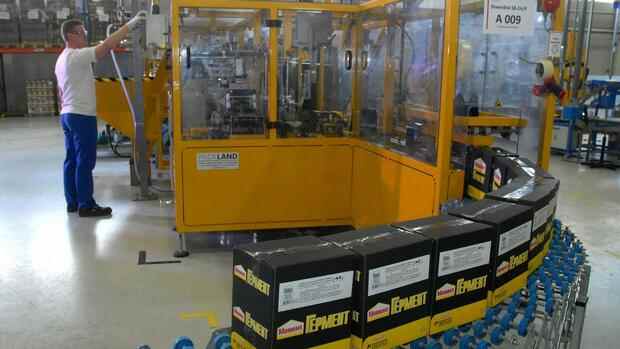The withdrawal from Russia is expensive for the consumer goods manufacturer.
(Photo: imago/Russian Look)
Dusseldorf While other companies announced their withdrawal from the Russian market immediately after the invasion of Ukraine, Henkel took two months to do so. For weeks, the Düsseldorf headquarters calculated the consequences of such a step. After all, the brand group from Düsseldorf has invested more heavily in Russia than any other Dax group. The Persil producer achieved five percent of its group sales there, around one billion euros, and employed 2,500 people in eleven plants.
In the meantime, the decision has been made to withdraw – also because of concerns about damage to the company’s image. The group also wants to withdraw from neighboring Belarus.
The traces in the balance sheet are already visible: the consumer goods group wrote off 184 million euros in the first half of the year. Of this, EUR 88 million relates to goodwill and EUR 82 million to property, plant and equipment. The missing 15 million euros can be explained by intangible assets such as trademark rights and licenses. Five percent of Henkel’s group-wide fixed assets are located in Russia.
For Chief Financial Officer Marco Swoboda, the high depreciation is a sign that Henkel is serious about its intention to sell. Henkel plans to sell parts of its business in Russia. “There is great interest in our business activities,” emphasizes CEO Carsten Knobel. According to the company, more than 80 expressions of interest from other companies have been received and a shortlist has been drawn up.
Top jobs of the day
Find the best jobs now and
be notified by email.
In addition to sales, a takeover by the management is another option. Already Dr. Oetker had separated from its activities in Russia with a management buy-out. “We may also shut down some areas completely because we don’t want our know-how to go to a competitor,” Knobel outlined the third option in an interview with the Handelsblatt in May.
>> Read about this: Henkel boss rejects criticism of Russia commitment: “We didn’t hesitate long”
Henkel wants to have the process completed by the end of the year. The group continues to produce in the country. In Russia, Henkel sells everyday products such as household, personal care and hygiene products, but also applications for DIY and construction, such as adhesive, sealing and insulation systems. Henkel was represented in Russia with its three divisions Adhesives, Detergents and Cleaning Agents and Cosmetics.
Four variants for the withdrawal from Russia
Not only Henkel, but also other German companies are currently facing the problem of doing business in Russia. Tanja Galander from the commercial law firm Graf von Westphalen names four options for an exodus from Russia. The company can be liquidated in Russia, but this is costly and difficult and, to their knowledge, is only practiced by “very few companies”.
Insolvency is also possible. However, there may be a risk of criminal prosecution by the Russian authorities if the insolvency is deliberately caused.
“In practice,” says Galander, “it’s more likely to shut down the business, not make any new investments, lay off employees and continue to operate the company on a very small scale.” Finally, the fourth and most common form is the sale of the company, for example to the Russian local management.
The good news for most Dax companies: Even before the Ukraine war, Russia was not a particularly large sales market for most. German companies tend to export to core European countries such as France and the Netherlands, as well as North America with the USA and Asia with China. According to Handelsblatt calculations, the 40 DAX companies generated almost one percent of their sales in Russia before the start of the Russian war of aggression in Ukraine. That was around 14 billion euros.
The abrupt withdrawal is manageable for most companies, despite all the difficulties, write-downs and losses.
More: Business in Russia: Risks worth billions are still slumbering in the balance sheets of the Dax companies
